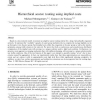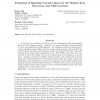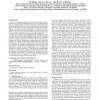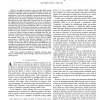1368 search results - page 90 / 274 » A Hybrid Reputation Model Based on the Use of Organizations |
CN
2000
13 years 10 months ago
2000
Based on a loss network model, we present an adaptive source routing scheme for a large, hierarchically organized network. To represent the ``available'' capacity of a p...
JMLR
2010
13 years 5 months ago
2010
In this study, we combined the ChIP-seq and the transcriptome data and integrated these data into signaling cascades. Integration was realized through a framework based on data- a...
ISLPED
2010
ACM
13 years 10 months ago
2010
ACM
Energy consumption and the associated environmental impact are a pressing challenge faced by the transportation sector. Emerging electric-drive vehicles have shown promises for su...
HICSS
2003
IEEE
14 years 3 months ago
2003
IEEE
The Technology Acceptance Model (TAM) predicts whether users will ultimately use software applications based upon causal relationships among belief and attitudinal constructs that...
TCOM
2011
13 years 5 months ago
2011
—In cognitive networks, since nodes generally belong to different authorities and pursue different goals, they will not cooperate with others unless cooperation can improve their...




